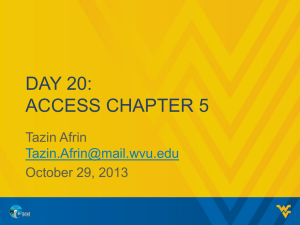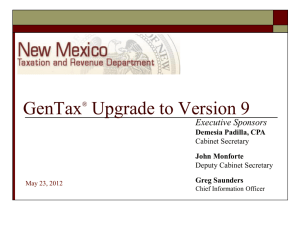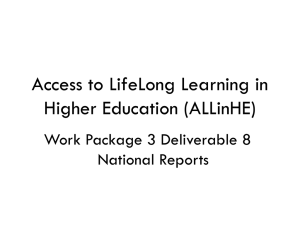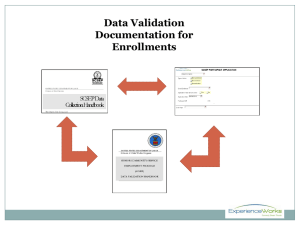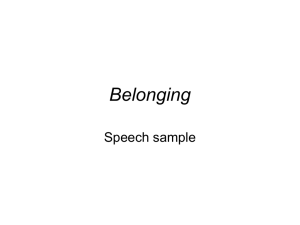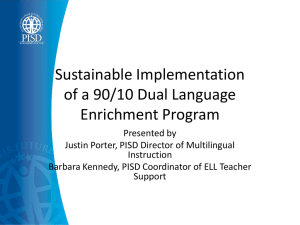Empirically Defining Validation, Sense of Belonging
advertisement
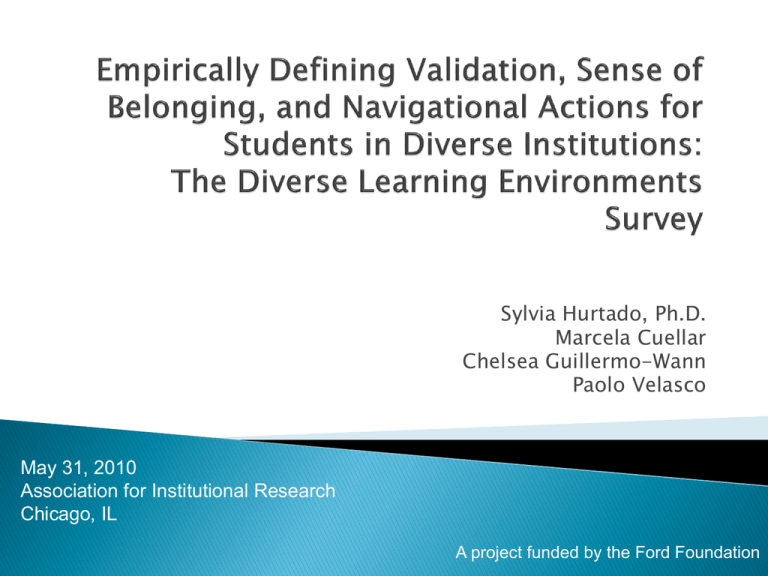
Sylvia Hurtado, Ph.D. Marcela Cuellar Chelsea Guillermo-Wann Paolo Velasco May 31, 2010 Association for Institutional Research Chicago, IL A project funded by the Ford Foundation Empirically examine innovative and established constructs in the Diverse Learning Environments pilot survey (DLE) ◦ ◦ ◦ ◦ General validation Validation by faculty in the Classroom Sense of belonging Navigational action Goal: Establish constructs that can be used to empirically examine relationships with student outcomes Assist educators in advancing the success of diverse students Assess undergraduate skills for work and citizenship in a pluralistic democracy Create the conditions for realizing the benefits of diversity in the learning process Increase retention rates and improve the assessment of retention Research: • Diverse Learning Environments Survey • Campus Case Studies of 8 Institutions • National Retention Study (Clearinghouse) Practice: • Institute for the Critical Analysis of Quantitative Data (July 13 – 15) • Diversity Research Institute (August 4 – 6) Sense of Belonging Validation Navigational Action & Capital Comprises cognitive and affective elements ◦ Cognitive level: information about experiences with a group as a whole and other group members ◦ Affective level: feelings that reflect the individual’s appraisal of their experiences with the group (Bollen & Hoyle, 1990) Original factor items ◦ I feel a sense of belonging to … ◦ I feel that I am a member of the … community ◦ I see myself as part of the … community Utilized in higher education research as a psychological sense of integration ◦ Illustrates the interplay between the individual and the institution (Hurtado & Carter, 1997) Original Bollen & Hoyle (1990) items modified to include broader concepts of cohesion DLE uses the original construct Factors Influencing Sense of Belonging ◦ Perceptions of the campus climate for both white and students of color (Hurtado et al, 2007; Locks et al, 2008) ◦ Positive interactions with diverse peers 2008) (Locks et al, Different college predictors for different racial/ethnic groups ◦ Course-related faculty interaction, co-curricular involvement, and perceptions of supportive residential environments (Inkelas et al, 2007) Sense of Belonging Impacts Persistence (Hausmann et al, 2007) “Validation is an enabling, confirming and supportive process initiated by in- and outof-class agents that foster academic and interpersonal development” (Rendón, 1994) Differs from earlier theories on student persistence and learning (most notably Astin’s Theory of Involvement) Examples of invalidation Forms of validation ◦ Academic validation ◦ Interpersonal validation Occurs both in- and out-of-class Never empirically examined at a national level DLE includes measures of both general validation from faculty and staff and validation in the classroom Qualitative research has examined validation Effects of validation on student experiences ◦ Feel capable of learning ◦ Experience a feeling of self worth ◦ Feel that they, and everything that they bring to the college experience, are accepted and recognized as valuable. ◦ Lacking validation, students feel crippled, silenced, subordinate, and/or mistrusted. Navigation is critical for increasing academic goal attainment (AAC&U, 2002) ◦ Equip students with the necessary knowledge to make informed decisions about appropriate routes for their academic goals (AAC&U, 2002) ◦ Actions and requisite knowledge represent navigational capital (Yosso, 2005) Students of color must develop academic resilience that enables them to navigate social institutions (Alva, 1991, Yosso, 2005; see Solorzano, Ceja & Yosso, 2000) Family & Community Support (Delgado Bernal, 2001; Solórzano &Villapando, 1998) Peer & Faculty Support (Solórzano, Ceja, &Yosso, 2000; Solórzano & Delgado Bernal, 2001; Solórzano & Villapando, 1998) Identifying Career Goals & Multiple Paths to It Having a Mentor Joining an Ethnic Organization DLE items measure navigational actions that demonstrate navigational capital at work ◦ Includes individual and community agency for students of color (Yosso, 2005) Integrated assessment of climate, diversity practice, and outcomes Inclusive of diverse social identities Modules targeting specific topics Longitudinal when linked with other student data (e.g. other CIRP surveys, registrar data, etc.) Nationally available CIRP survey in Spring 2011 Core Survey Modules ◦ ◦ ◦ ◦ ◦ Classroom Climate Transition into the Major Intergroup Relations Community College Students’ Transfer Pathway Transition Experiences for Transfer Students at four-year Institutions Online administration between January – May 2010 14 institutions (9 represented in this analysis) ◦ 1 - community college (Midwest) ◦ 3 - four-year private institutions (West, Midwest, East) ◦ 5 - four-year public universities (West) Target sample: cohorts of second year and third year students ◦ Some institutions chose to sample additional cohorts n = 3,306 undergraduate students Racial/ethnic demographics* ◦ ◦ ◦ ◦ ◦ ◦ ◦ Black – 6% Asian American/Asian/Pacific Islander – 19% Latina/o – 19% White – 68% Native American – 6% Arab American/Arab – 2% Other – 2% Student characteristics ◦ 11% Frosh, 31% Soph, 32% Junior, 25% Senior 33% transfer and 9% re-entry students * Students could choose multiple categories Structural Equation Modeling to conduct Confirmatory Factor Analysis Partial correlations Cross-tabulations Items Factor Loadings I see myself as part of the campus community .91 I feel that I am a member of the campus community .95 I feel a sense of belonging to my campus .81 Model-Fit Results χ² .000 df 0 NFI 1.000 Items Factor Loadings Faculty empower me to learn here .50 At least one staff member has taken interest in my development .88 Faculty believe in my potential to succeed academically .76 Staff encourage me to get involved in campus activities .49 Staff recognize my achievements .66 At least one faculty member has taken interest in my development .89 Model-Fit Results χ² 458.7 df 9 CFI .93 Items Factor Loadings Instructors were able to determine my level of understanding of course material .76 Instructors provided me with feedback that helped judge my progress .81 I feel like my contributions were valued in class .82 Instructors encouraged me to meet with them after or outside of class .64 Instructors encouraged me to ask questions and participate in discussions .72 I received recognition for my work .72 Model-Fit Results χ² 390.23 df 9 CFI .94 Factor Sense of Belonging General Validation Validation in the Classroom --- .57** .37** General Validation .57** --- .59** Validation in the Classroom .37** .59** --- Sense of Belonging p < .01 Validation Items Sense of General Class Belonging Discussed career goals .06*** .08*** --- .06*** --- --- --- Attended professor’s office hours Participated in study groups .05** Creating a plan to achieve career goals .05** Participated in faculty/mentor program Participated in the Ethnic or Cultural Center activities --.06*** .04* .04* .07*** .05** --- .04* --- *** p < .001 ** p < .01 * p < .05 How often have you sought support from the following to successfully complete college? (5 pt Likert scale: never, seldom, sometimes, often, very often) Validation Items Sense of Belonging Upper class peers .08*** --- --- Peers in your same year .08*** --- --- -.08*** --- Academic counselors --- General Class Faculty .08*** .29*** .23*** Staff .09*** .09*** --- *** p < .001 ** p < .01 * p < .05 Institutional Type Low Middle High Community College 10% 69% 21% Four-year public 18% 66% 16% Four-year private 9% 68% 23% χ² = 62.85 p < .001 Institutional Type Low Middle High Community College 15% 61% 24% Four-year public 20% 66% 14% Four-year private 11% 70% 19% χ² = 66.28 p < .001 Empirically identified useful constructs of validation to capture student experience Useful in revised conceptual models for retention and future research Student navigational actions are related to validation and sense of belonging, empowering students to learn Seeking faculty support is key to increased general validation and within the classroom Staff are often left out of frameworks, however, preliminary research indicates they are important Frequent use of academic counselors appear to influence a lower sense of general validation Peer networks are central to sense of belonging Final validation of these and other innovative DLE constructs Develop studies examining relationships between these constructs and key student outcomes, e.g. retention National launch of DLE survey through CIRP ◦ Spring 2011 Higher Education Research Institute http://www.heri.ucla.edu Diverse Learning Environments Project Website: http://heri.ucla.edu/dle Email: dleproject@gseis.ucla.edu Phone: 310-267-5930
